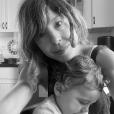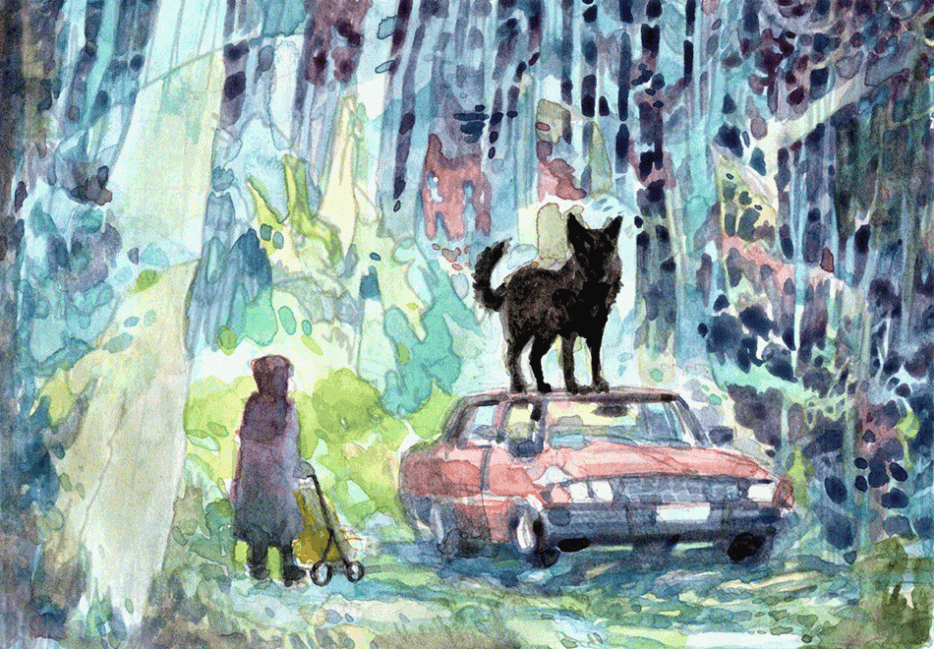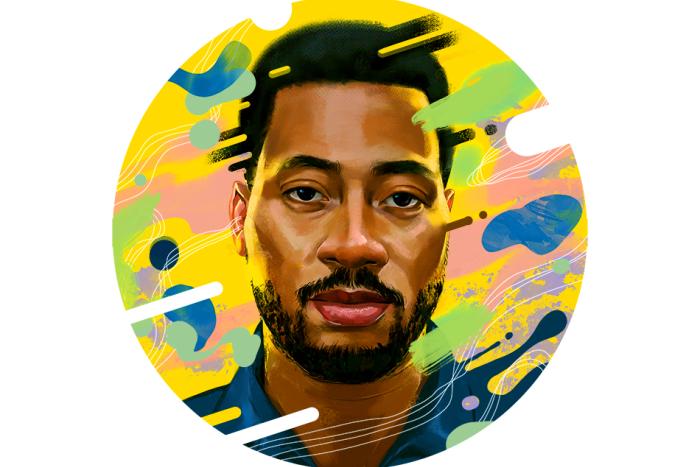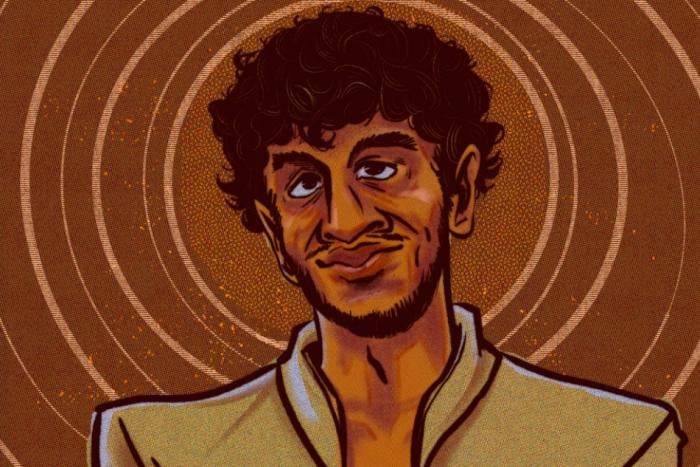I imagine eggs, imagine whipping the yolks in a glass bowl with a fork and lightly scrambling them. But by the time I open the refrigerator my appetite has evaporated. Nick is buttering an everything bagel. He is topping it with everything-bagel seasoning. I picture my mother. The ’80s version of her: rail-thin like a scarecrow, her breast milk dried up, cutting out coupons to stack in a neat pile, chain-smoking Benson and Hedges Ultra-Light Menthols, doing taxes—endless—in the kitchen with flowery linoleum flooring that she’d wipe clean on her knees. My mother bruised easily.
Today, I will consume my mother. That’s what you do when you’ve lost someone. And to do this consuming of my mother, I will purchase a funnel. That’s how you slow down the process of absorption when, unsolicited, your in-laws come to visit to be helpful and tell you you’re too skinny. Do you feed this baby? they want to know. Soon your body will disappear like condensation dribbles down a shower door into nothing, they don’t say. For days afterward, this baby screams at the boobs. The internet says she is protesting. Nick says to please close the refrigerator door, otherwise the food will rot.
I have this baby. We have this baby. This baby emerged like a lightning bolt onto the scene, as I preferred to see the hospital room where the lower half of my body knelt bare, a leftover part like a tree stump in the woods. Those present at her birth said that watching her be born was like nothing they’d ever seen. But I cannot imagine this to be true. She’s been here this whole time. This baby is of the forest. We, you and I, were painted back into the image. You and I are the ones who are fortunate to be allowed to join her in her environment, and if we’re not careful, we could just as easily be taken away. Not she, or the clouds and trees, I say, or so I think. Only much later do I realize I did not speak for days after giving birth. I have misplaced my voice like a set of house keys and people keep saying no worries those things are not lost they’ve just gone missing, and I want to seismic-volcano shit on their faces like this baby does in her sleep. When this baby shits like a volcano she is calm, and she is this enviable way because she is telling the truth.
Nick and I bring this baby home to find that the crows have left feathers by our front door; the squirrels have left acorns—some intact, others cracked—there too. Those first few weeks, ladybugs managed to enter, without ingress, to fly around our bedroom in the attic.
In public, strangers tell me many things about this baby. Perfect strangers have a lot of thoughts, even when they’re passing by hastily. I wonder if they’re so thoughtful on their own time, alone, no human in sight, in their bedrooms, coming to grips with what ails them. Nobody once mentions to me that babies are ravenous. This baby came starved. But by the time I’m willing to share this about hunger, everyone has vanished. The stage has been emptied; the cast and crew have gone, leaving plastic water bottles and sandwich crusts strewn throughout the parking lot.
Nick tells me about this wildly popular woman online who says cribs are cages. Babies need to be free to sleep where they want to sleep. Apparently, she’s a personality. I haven’t read this, myself, but Nick, father of this baby, finds it amusing. Our senses of humour have diverged these past three months. He knows everything there is to know about keeping this baby safe. He listens to the best baby audiobooks on triple speed. I’m not losing my hair along with this baby, he says, as is to be expected. I write myself an email reminder to boob feed the baby. Nick continues. He says I am a goddess, empties another box of red wine that he keeps chilled in the fridge, and spins the hairs on his chest like he’s screwing in little screws until they have become ingrown and inflamed.
It takes some doing, some mustering of internal resources, but I try to get out of the house daily to see the sky or the ruptured sewage pipe. Most of the time, once outside in public, I get distracted by the drone that someone uses to monitor the landscape. It zips by buzzing. When this baby is napping, and in the privacy of the bathroom, I will unearth my folded sheets of paper from beneath a packet of baby wipes made almost exclusively of water and I will continue drafting my war plan to devour it. The drone, of course.
When the day feels unending, I try to get to the sidewalk and make sure to look, really look—using my jaw and skin—at the toppled traffic cone, lying on its side on the mud in front of the meth-house where they’ve been digging up the sewage pipe. To prepare for this, I put on what I have handy, a grey synthetic nursing sweatshirt, and head for the front door. Nick follows me closely. He asks what I’m up to. Off to see the sky, I tell him, ruefully. He would prefer me to stay inside and write, or at least write hate mail to the designers of this nursing sweatshirt. He doesn’t even think the sweatshirt is worth donating. The drawstrings were poking the baby’s eyes while she was fiend feeding. He had to find scissors that worked to chop them off so that they wouldn’t poke this baby’s eyes out. This search of his—to locate working sharp scissors—took time.
From the sidewalk, I find my tongue, which has been on holiday, and roll the word fuckwad around in my mouth like a marble, immediately feel unkind, and immediately feel exhausted. I have again forgotten to brush my teeth. I wish dental floss were called crevice pleaser. I wish there were more inventive ways to fool ourselves. How much will I need to relinquish to not fail this baby? Or do I mean this body?
I look down to be sure I’m still covering my breasts, which, like garments dangling on a backyard clothesline, do their own thing in the wind without my knowledge. And then there are the origins of things. Ceres, the mother of agriculture in Ovid’s myth, scours Earth for her abducted daughter Proserpina, who only hours earlier had been dancing in a field of flowers. Jupiter, both a super-god and Proserpina’s father, will urge Ceres to compromise. He will encourage Ceres to view the child’s abductor as not so bad—these things are nuanced, he’ll be candid. Moreover, super-god Jupiter reasons: If this daughter does not belong in hell, then she will not be tempted to eat the food in hell. Even I know hell’s food is the only food. This daughter will eat hell food. Her tortured existence, her nature divided—seesawing between heaven and hell—will give us the seasons. Like one of those constant tickles at the back of the throat, a persistent voice has another message: If only I could be so lucky. Like my mother, I say deranged things and wish to be as free as I wish to be.
I begin to clean the dirty railing with the sleeve of my synthetic sweatshirt, which works wonders, and I am annoyed it has taken me so long to figure this out. Nick leans over the railing with this baby draped over his shoulder, says it’s pretty chilly and asks if I’m warm enough.
My mother’s middle name became her first name. She gave it to me as a middle name, which has stayed my middle name, and most call me by both my first and middle, swizzled together. I have named this baby after my mother’s mother, my grandmother, who died when my mother was in her twenties and therefore was dead by the time I was born. This baby will never meet her grandmother either. My mother, living, refuses to see me. I have done something willfully tragic. I only eat hell food. I have asked for a break from my stepfather. Because of this, my mother explains via email, if she were to see me, she would be betraying him. She elucidates: Therefore, she refuses to meet this baby. Like I know nothing of explicitness.
Every time I pause to draft a response, to write my mother that this baby is just a baby and knows more about betrayal, along with all the other babies, than anyone, my boobs start burning.
The sky cracks, streams of light pour over the busted sewage pipe, and then the sky dumps rain. This phenomenon, water dumping from above and the city flooding, is known as an atmospheric river. A man from the meth-house has come outside to move the mud around the fractured sewage pipe with a shovel, but he does not right the fallen construction cone.
I need a few things from a big store. A huge well-lit store. I leave Nick with this baby and take myself to Home Depot to buy a funnel and an imperfect square of laminate flooring that I will put on my pillow to later rest my head. Deva, a tall brunette with flashy red clogs, which click and clack, asks how many yards I’d like. What do I need? I am close to the part of Deva’s chest where her name tag hangs. Her exposed mouth smells of sugary cinnamon gum. Deva, who smells of warm, inviting spices, is asking me what I need in yardage, and the lighting in the aisle is unflattering and her shoes are her transportation.
I drive home from Home Depot chewing five sticks of gum, thinking about origins, wads, and delirium. My desire to drive toward oncoming traffic is a result of delirium. Listening to the news, this is what I tell myself about delirium. The windshield wipers make a wretched weeping sound as they struggle to mitigate the downpour. This baby has started to cry out in her sleep. A terror howl, a wild shrill beast pitch only another beast would know. I refuse to name and therefore understand the sound. I cannot handle the meaning, especially while driving. Or, as my mother would say: I cannot go there.
There’s a woman standing in the median, a stroller stuffed with plastic bags full of her belongings. Cars drive past in a hurry to run the red light. I stop at the red light and feel out of touch. I worry the neighbours we share the duplex with will complain about this baby to the ruthless management company, who will find a way to evict us. Property values. I fear those we share our walls with will turn Nick and Me and This Baby in for being alive in the winter. This blurry accusation is unfounded. I know very well that I am delirious. Furthermore, our neighbours are liberal. Their values are expressed on their delineated part of the property. Their signs are written in both English and Spanish. One such warm sign says WELCOME in Hebrew. It hangs in their window with the dark curtains drawn. I pass, trying to catch a peek inside their half of the duplex like a pervert. I would like to know how they’ve handled the layout. Wearing my grey titty hoodie, I think—fascism is in vogue.
Back inside our part of the duplex, I don’t feel like being a good mother. Parched, I go looking for my mug in the shape of a walrus. The one mug I’ve carried with me from job to job, apartment to apartment, across America, and I cannot find it. Nick says I’m smacking my gum; he doesn’t think he’s ever seen me chew chewing gum before. He wonders if I’m okay. Is it called chewing gum so you don’t do something foolish? I do not ask. I’ve misplaced my walrus mug of decaf for the seventh time in four days. I won’t do the math. Nick says to make a new one—to give myself a fresh cup of freeze-dried instant decaf from Europe. Maybe, I think, and wonder how Nick knows it’s from Europe since I’ve covered over the label with a glossy sticker depicting two dolphins catching air. It wasn’t that expensive, Nick says about the coffee. This would be a great opportunity to show him how much I love him, but I am relentless. I’ve spent twenty minutes ignoring him, staring at a hairy black spider on the ceiling that is harmless. The bath Nick has made for me has turned cold. He doesn’t need to say it. The spider is very still. I say BOO—and nothing.
“Re: last boob feed” is the subject of an email thread I started from myself to myself after this baby was born; she’d lost so much weight after coming home from the hospital that I began keeping a diligent record of her feeding. I no longer mark whether it’s AM or PM. It’s a collection of times that run together, which can read like an abstract painting reads. Several nights ago, it seemed this baby was officially done with me and the boobs: too much environmental stress and exhaustion. I began to cry thinking it might be the last time I hit reply to the last boob feed email. There are so few connections I am reluctant to relinquish them.
Our bedroom is in the attic. Every night the three of us crawl up there to attempt sleep. This baby sleeps next to us in her own little bed. If she doesn’t, we are told we will kill her. That is not what we want most of the time. To be safe, she will sleep there next to us in her bassinet for the next several months until she is able to sleep alone. I wonder if I’ll toss out the baby monitor. But I want to be another kind of mother. I am determined to be different, until I realize we’re all addicts. Addicted to our pain, to cable, to whatever.
Nick sleeps naked beside me. I am wearing the heavy blankets around my neck like I’ve been beheaded. The father of this baby is smiling in his sleep. I am relieved he has found some joy with his eyes closed and I feel joy next to his joy. The room is alarmingly quiet. I check on this baby. Though this baby lies still as the dead, she is breathing. I feel her. Again, I pull the warm blankets back up around my neck, only to discover the wad of gum from earlier has gathered my hair into an orb of a mess. Anne Boleyn did not need her head to remain impactful—truth. The weather in Great Britain isn’t all that different than it is here—also true. Also true, Anne Boleyn had a baby who became the greatest queen there ever was.
I remind myself this baby does not belong to me. That she has been here all along. She is of the forest like trees are of the forest. Her presence comes in every direction like a compass. I am a guest in my life. Where did I put the funnel? I wonder.
Before bed, I bathe this baby in the bath, as my mother did with me, though in the shower, singing songs like “You Are My Sunshine,” as the words were written inside a waterproof songbook, like time stood still, which it very well might in water. In the bath, I sing songs to this baby, ridiculous songs that I make up on the spot, and she behaves as though she is singing along. This evening, in the bath, she didn’t allow me to remove the dried milk solids encrusted around her mouth in the shape of another mouth. Though she remembered the trick the hospital midwife taught us: my mouth kisses on her mouth so that she will open her mouth to latch.
It’s too dark now to see it, but in our bedroom there’s a large ornate mirror that hangs on the wall, which is beige. The entire room is painted beige, a true beige. The large mirror was a gift from a friend in Mexico. What I like most about it is the reflection. In the light, from where I lie, mother of this baby with no mother with no mother, it reflects the opposite wall, also beige, such that it doesn’t seem like a mirror at all.






